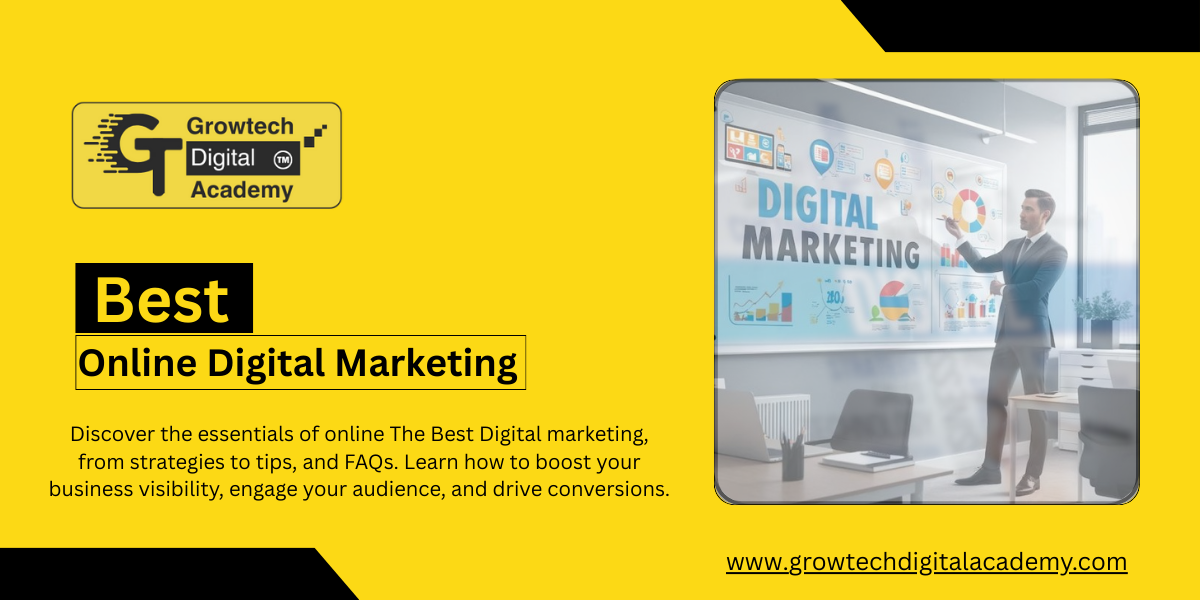Introduction:
In today’s digital age, online marketing is the beating heart of any successful business strategy. Whether you’re a small business owner, a freelancer, or a corporate giant, you can’t afford to ignore its power. But what does online marketing really mean, and how can you harness it to grow your brand? With so many tools, platforms, and strategies at your disposal, navigating the landscape can feel overwhelming. Fear not! This guide is here to simplify things, give you actionable tips, and answer all your burning questions about online marketing.

What is Online Marketing?
Online marketing, also known as digital marketing, refers to promoting your products, services, or brand through the internet. It’s all about connecting with your audience where they’re most active—whether on social media, search engines, or email. But it’s not just about selling; it’s about building trust, establishing authority, and creating long-term relationships with your audience.
Why is Online Marketing Important?
- Global Reach: Connect with audiences across the globe without geographical restrictions.
- Cost-Effective: Compared to traditional marketing, digital platforms often offer better ROI.
- Targeted Approach: Reach the right audience with laser-focused targeting based on demographics, behaviors, or interests.
- Measurable Results: Track campaign performance with detailed analytics, ensuring you’re always in control.
Key Components of Online Marketing
1. Search Engine Optimization (SEO):
If your website isn’t ranking on Google, you’re missing out on a massive chunk of potential traffic. SEO involves optimizing your site to rank higher in search engine results pages (SERPs).
- Use targeted keywords like “online marketing” strategically in your content.
- Focus on high-quality backlinks and site speed.
- Don’t ignore mobile optimization—Google loves mobile-friendly websites.
2. Content Marketing: The Best Digital marketing
Content is king, but only if it’s relevant and valuable. Whether it’s blog posts, videos, infographics, or eBooks, content marketing is about educating and engaging your audience.
- Create evergreen content that remains relevant over time.
- Leverage storytelling to make your brand relatable.
- Mix up content formats to cater to different preferences—some people love to read, others prefer watching.
3. Social Media Marketing:
Social platforms like Facebook, Instagram, LinkedIn, and Twitter are goldmines for connecting with your audience.
- Post consistently to stay top-of-mind.
- Use paid ads to amplify your reach and drive conversions.
- Engage with your audience through comments, polls, and direct messages.
4. Email Marketing: The Best Digital marketing
Don’t underestimate the power of a well-crafted email. It’s one of the most direct ways to reach your audience.
- Personalize your emails to make your audience feel valued.
- Use attention-grabbing subject lines to increase open rates.
- Segment your email list to deliver tailored content.
5. Pay-Per-Click (PPC) Advertising: The Best Digital marketing
PPC campaigns, like Google Ads, help you gain immediate visibility. You only pay when someone clicks on your ad, making it cost-effective for lead generation.
- Focus on high-converting keywords.
- A/B test your ad creatives to find what resonates most.
- Monitor performance metrics to fine-tune your campaigns.
Tips for Successful Online Marketing
-
Know Your Audience:
If you don’t understand your audience, you’re shooting in the dark. Use tools like Google Analytics or Facebook Insights to learn about their preferences, behaviors, and pain points. -
Set Clear Goals:
What do you want to achieve—more traffic, leads, or sales? Having clear objectives will guide your strategy. -
Leverage Video Content:
Video content is taking the internet by storm. Whether it’s Instagram Reels, YouTube tutorials, or clips, videos are highly engaging and shareable. -
Focus on User Experience (UX):
A clunky website won’t cut it. Prioritize site speed, intuitive navigation, and mobile responsiveness to keep visitors engaged. -
Stay Updated:
The digital landscape is ever-changing. Keep up with trends, updates, and algorithm changes to stay ahead of the competition. -
Measure Everything:
What gets measured gets improved. Track your KPIs (Key Performance Indicators) to identify what’s working and what’s not.
